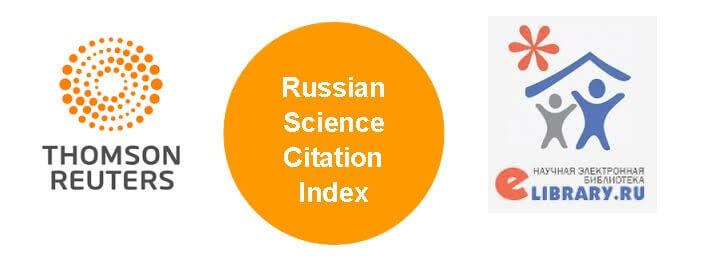Microstructural and hydrophilic properties of polyethylene terephthalate glycol polymer samples with different 3D printing patterns
Abstract
The aim of the work is to study the influence of the 3-D printing process with the Hercules Original printer by sequentially applying polymer layers using the FDM (Fused Deposition Modeling) method on the microstructural and hydrophilic properties of polyethylene terephthalate glycol (PETG) samples with different printing patterns. X-ray phase analysis revealed the presence of a greater ordering of amorphous PETG polymer chains in printed samples, which occurs during thermal and mechanical impact on the initial filamentous sample during 3D printing. This manifests itself in the increase of relative intensity for the main diffraction peak of the amorphous PETG polymer by an order of magnitude for all of the samples with five different print patterns. At the same time, IR spectroscopy data revealed the preservation of all intrastructural chemical bonds of the polymer both in the original thread and in printed samples. Close contact angles of about q≈50° for all printed samples, which is much smaller than the right angle q=90°, show that the surfaces of all five printed PETG samples with different patterns are hydrophilic
Downloads
References
Vidakis N., Petousis M., Velidakis E., Liebscher M., Mechtcherine V., Tzounis L. On the strain rate sensitivity of fused filament fabrication (FFF) processed PLA, ABS, PETG, PA6, and PP thermoplastic polymers. Polymers.2022;12: 2924. https://doi.org/10.3390/polym12122924
Silva A. L., Salvador G. M. da S., Castro S. V. F., Carvalho N. M. F., Munoz R. A. A. 3D printer guide for the development and application of electrochemical cells and devices. Frontiers in Chemistry. 2021;9: 684256. https://doi.org/10.3389/fchem.2021.684256
Vidakis N., Petousis M., Tzounis L., … Mountakis N. Sustainable additive manufacturing: mechanical response of polyethylene terephthalate glycol over multiple recycling processes. Materials. 2021;14: 1162. https://doi.org/10.3390/ma14051162
Gordeev E. G., Ananikov V. P. Widely accessible 3D printing technologies in chemistry, biochemistry and pharmaceutics: applications, materials and prospects. Russian Chemical Reviews. 2020;89(12): 1507–1561. https://doi.org/10.1070/rcr4980
Bex G. J. P., Ingenhut B. L. J., Cate T., Sezen M., Ozkoc G. Sustainable approach to produce 3D-printed continuous carbon fiber composites: A comparison of virgin and recycled PETG. Polymer Composites. 2021;42: 4253–4264. https://doi.org/10.1002/pc.26143
Schneevogt H., Stelzner K., Yilmaz B., Abali B. E., Klunker A., Völlmecke C. Sustainability in additive manufacturing: exploring the mechanical potential of recycled PET filaments. Composites and Advanced Materials. 2021; 30: 263498. https://doi.org/10.1177/26349833211000063
Latko-Durałek P., Dydek K., Boczkowska A. Thermal, rheological and mechanical properties of PETG/rPETG blends. Journal of Polymers and the Environment. 2019;27(11): 2600–2606. https://doi.org/10.1007/s10924-019-01544-6
Dolzyk G., Jung S. Tensile and fatigue analysis of 3D-printed polyethylene terephthalate glycol. Journal of Failure Analysis and Prevention. 2019;19: 511. https://doi.org/10.1007/s11668-019-00631-z
Hassan M. H., Omar A. M., Daskalakis E., … B´artolo P. The potential of polyethylene terephthalate glycol as biomaterial for bone tissue engineering. Polymers. 2020;12: 3045. https://doi.org/10.3390/polym12123045
Sobolev D. I., Proyavin M. D., Parshin V. V., Belousov V. I., Ryabov A. V. Broadband, low-reflection microwave windows manufactured using 3D printing*. In: X All-Russian Scientific and Technical Conference “Microwave Electronics and Microelectronics”. Collection of reports. Saint-Petersburg, 31 of May – 4 of June, 2021. Saint Petersburg. St. Petersburg: St. Petersburg State Electrotechnical University “LETI” Publ.; 2021. p. 52. (In Russ.)
Kiselev M. G., Savich V. V., Pavich T. P. Determination of contact wetting angle on flat surfaces. Vestnik BNTU. 2006;1: 38. (In Russ., abstract in Eng.). Available at: https://www.elibrary.ru/item.asp?id=21398120
Elesina V. V. Contact angle. Guidelines. Altai State Technical University named after. I. I. Polzunov Publ.; 2019: 22. (In Russ.)
Loskot J., Jezbera D., Bušovský D., … Zubko M. Influence of print speed on the microstructure, morphology, and mechanical properties of 3D-printed PETG products. Polymer Testing. 2023;123: 108055. https://doi.org/10.1016/j.polymertesting.2023.108055
ICDD Card: 04-003-0648 tetragonal TiO2 15. Pereira A. P. dos S., da Silva M. H. P., Júnior É. P. L., Paula A. dos S., Tommasini F. J. Processing and characterization of PET composites reinforced with geopolymer concrete waste. Мaterials Research. 2017; 20(suppl2): 411–420. https://doi.org/10.1590/1980-5373-mr-2017-0734
Copyright (c) 2024 Condensed Matter and Interphases

This work is licensed under a Creative Commons Attribution 4.0 International License.













